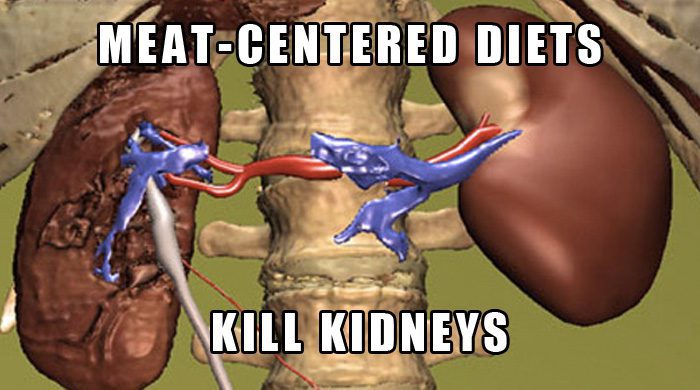A Meat And Dairy Acidic Diet Kills Your Kidneys And Here’s The Science To Prove It

When you compare the kidney function of vegans, vegetarians, and omnivores, which group do you think has the best kidney function?… Which group did you guess? If you guessed the omnivore group you were wrong! The vegan group had the best kidney function followed by the vegetarian group.
Can you guess why? The vegan diet is the least acidic diet of the three. Meat and dairy are acidic forming in the body while plants are generally alkaline forming in the body.
Well why does that matter? This study[1] referenced in the video breaks down what an acidic meat-centered diets does in the body scientifically.
The digestion of meat and dairy produce highly acidic compounds in the body that damages the body and the kidneys in different ways.
Why does high acidity hurt the kidneys? There are two theories as to why acidity damages the kidneys and we don’t have to look at them as being contradictory but can look at them as being complimentary.
High acidity in the kidneys is believed to damage the urine making tubes in the kidneys. The kidneys counteract the acidity of meat and dairy products by ramping up ammonia production, which is a alkaline base, to neutralize the acid.
This is beneficial in the short-term but when meat and dairy are eaten constantly and produces chronic acidity, the body keeps the kidneys flooded with ammonia which becomes toxic to the kidneys.
The other theory is the acidic pH increases the production of free radicals that cause oxidative stress, renal damage, and scarring of the kidneys.
It is the digestion of the sulphur rich proteins in meat and dairy that produce unwanted levels of acid in the body.
Plants contain far less sulphur containing protein than meat and dairy do, so when plant and their proteins are digested they generally end up producing alkaline byproducts or compounds that don’t compromise the health of the kidneys.
[1] T Banerjee, D C Crews, D E Wesson, A Tilea, R Saran, N Rios Burrows, D E Williams, N R Powe; Centers for Disease Control and Prevention Chronic Kidney Disease Surveillance Team. Dietary acid load and chronic kidney disease among adults in the United States. BMC Nephrol. 2014 Aug 24;15:137.






